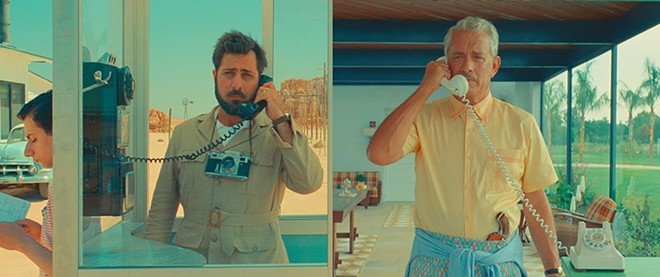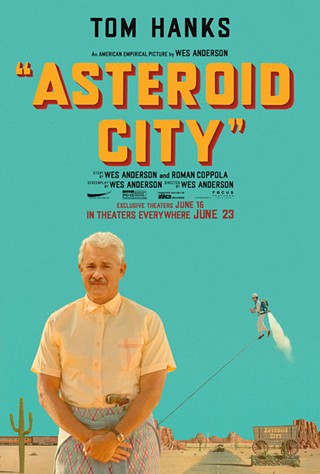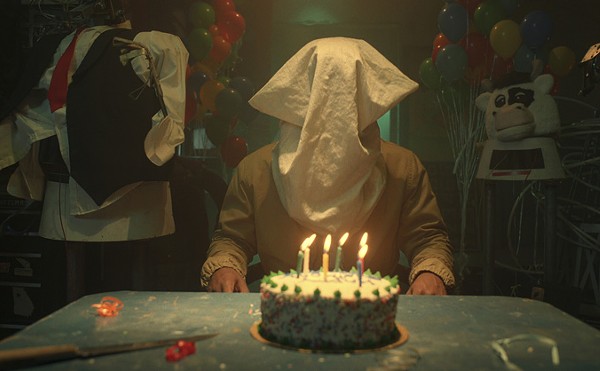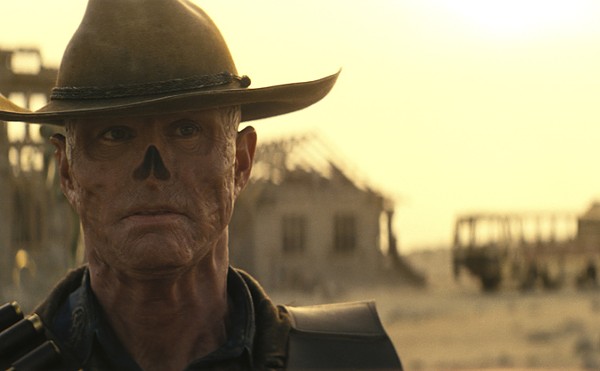
Insistently eccentric, involuted and reflexive, Wes Anderson's Asteroid City will likely only reinforce his detractors' animus toward the filmmaker's elaborate but undeniably insular world-building, but admirers — and I'm among them — will delight in the dizzying variations he works on signature themes and tropes. Although Asteroid City sometimes comes perilously close to the Rube Goldbergian joke constructions of Steven Spielberg's 1941 — with setups so baroquely complex that the payoff laughs are more theoretical than actual — it never tips over into self-indulgence. Like Anderson's best work, the film adroitly balances comedy and melancholy, absurdity and profundity, and what might initially appear a feather-light, pastel-hued dessert confection instead proves an intellectually and emotionally rich multi-course meal.
Film Details
In most of his previous films, Anderson used a variety of devices — narrators, chapter breaks, curtains, faux books — to foreground the constructed nature of his stories. That conceit seemed to reach its apotheosis in The Grand Budapest Hotel, with its Russian-nesting-dolls structure and mutating aspect ratios, but Asteroid City actually one-ups that predecessor in the deployment of Brechtian distancing effects. Beginning as a mid-1950s TV show — in period-appropriate black-and-white and 4:3 Academy ratio — the film purports to offer a behind-the-scenes peek at the development of a Broadway play, also named Asteroid City, by writer Conrad Earp (Edward Norton). The film then transitions to a staging of Asteroid City — in widescreen and color — and subsequently toggles between the theatrical production and the television show. The program's host (Bryan Cranston) periodically offers explication and provides both re-creations and documentary footage — which, significantly, are never clearly distinguished — of key moments in the play's evolution.
The play is set in the titular Asteroid City, a tiny burg in the Southwest that owes its modest existence to the ancient crater formed by the impact of the Arid Plains meteorite. The town, whose tight cluster of buildings includes an observatory presided over by Dr. Hickenlooper (Tilda Swinton), hosts the annual Junior Stargazer Convention and Asteroid Day to celebrate the scientific achievements of several gifted teens. Among those arriving for the 1955 festivities are recently widowed war photographer Augie Steenbeck (Jason Schwartzman) and his children, "brainiac" son Woodrow (Jake Ryan) and three young but extremely willful daughters. Also filling up the lone motel's cabins are movie star Midge Campbell (Scarlett Johansson) and her precocious daughter, Dinah (Grace Edwards), who will both become romantically entangled with the Steenbeck père et fils; three other prodigies and their parents (Liev Schrieber, Hope Davis, Stephen Park); Montana (Rupert Friend) and his stranded cowboy band; a teacher (Maya Hawke) and a busload of her 8-year-old students; and, belatedly, Augie's crusty father-in-law (Tom Hanks).
The gathering of this diverse tribe, already enlivened by Midge's glamorous presence, becomes even more eventful when a spacecraft suddenly appears during a group viewing of "astronomical ellipses" (yes, that would be three illuminated dots in the heavens, with Anderson shamelessly putting the "pun" in punctuation). As the stunned crowd gapes, a lanky stop-motion alien descends from the ship, plucks the meteorite from its resting place and unexpectedly spirits it into the sky. General Griff Gibson (Jeffrey Wright), conveniently on hand for the scientific proceedings, immediately places the town under quarantine and imposes an information blackout. But the military can't thwart the teens' collective ingenuity, and when they manage to leak word of the alien visitation to the world, Asteroid City soon becomes overrun with throngs of curiosity seekers.
If this summary seems unduly windy, be assured that it barely hints at the story's many convolutions (or, for that matter, the jaw-dropping enormity of the film's starry cast, which also includes Willem Dafoe, Margot Robbie, Adrien Brody, Steve Carell, Matt Dillon, Hong Chau and Jeff Goldblum). But plot, despite its superabundance here, isn't really Anderson's focus: Asteroid City is far more a witty meditation on theater and acting than a comic riff on Cold War paranoia, government secrecy and coercion, or the military-industrial complex's cooptation of scientific discovery (though it deals in all of those, too). Anderson's interest in the stage has figured tangentially in much of his work — see Rushmore, The Royal Tenenbaums and Moonrise Kingdom — but Asteroid City positions mid-20th-century American theater front and center (as in one of his symmetrical compositions). Anderson certainly pokes some gentle fun at that era's innovative figures, whether writers, directors or Method acting teachers, but the jokes in no way diminish his obvious affection and admiration.
The film is especially insightful on the acting process and its probing search for signs and meaning (an impulse it shares with the play's scientists). In the first meeting between Earp and his play's eventual lead, for example, actor Jones Hall (Schwartzman again) expresses confusion over what motivates Augie to impulsively burn his hand on a hot griddle. Because we haven't yet seen that action, the question doesn't fully register, but after the scene appears in the play, Asteroid City returns to explore it in the TV show when a distressed Hall leaves the stage in the middle of a performance to confront his director about whether he's properly capturing the character: He's still striving to grasp the significance of that self-mutilating gesture.
As impressive as Schwartzman is in his dual roles, Johansson merits particular praise in this regard: Not only is she also creating two distinct characters, but because she's essaying the role of a movie star in the play, there's yet another layer of artifice that requires peeling, and the remarkable scene in which she rehearses a bathtub suicide for a future film is a head-spinning astonishment.
In fact, "head-spinning astonishment" can just as appropriately serve as a description of Asteroid City — a film of ceaseless invention, visual splendor and wry, often rueful amusement.
Subscribe to Orlando Weekly newsletters.
Follow us: Apple News | Google News | NewsBreak | Reddit | Instagram | Facebook | Twitter | or sign up for our RSS Feed
















